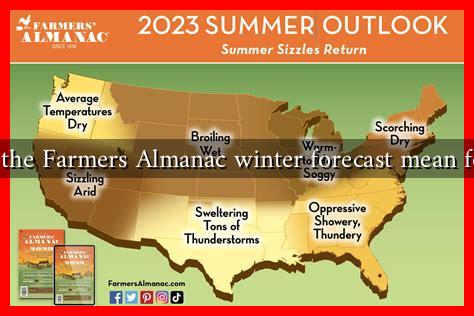-
Table of Contents
What Does the Farmers Almanac Winter Forecast Mean for Snowfall?
The Farmers Almanac has been a trusted source for weather predictions since its inception in 1818. Each year, it releases a winter forecast that many people rely on for planning their seasonal activities. But what does this forecast really mean for snowfall? In this article, we will explore the methodology behind the Farmers Almanac’s predictions, the implications of its winter forecast, and what it could mean for snowfall across the United States this winter.
The Methodology Behind the Farmers Almanac Forecast
The Farmers Almanac uses a unique formula to predict weather patterns, which includes a combination of solar cycles, planetary positions, and historical weather data. Unlike the National Weather Service, which relies heavily on computer models and real-time data, the Farmers Almanac’s approach is more traditional and has a long-standing history.
- Solar Activity: The sun’s cycles can influence weather patterns, and the Almanac takes these into account.
- Planetary Positions: The alignment of planets can affect atmospheric conditions, which the Almanac considers in its forecasts.
- Historical Data: By analyzing past weather patterns, the Almanac can identify trends that may repeat in the future.
This blend of science and tradition allows the Farmers Almanac to make predictions that resonate with many people, even if they are not always accurate. For instance, the 2022-2023 winter forecast predicted a colder and snowier winter for the Midwest, which turned out to be true in many areas.
Understanding the Winter Forecast
The Farmers Almanac’s winter forecast typically includes predictions for temperature and precipitation, including snowfall.
. The forecast is divided into regions, allowing readers to understand what to expect in their specific area. The 2023-2024 winter forecast, for example, has indicated a mix of cold and mild spells across the country, with varying snowfall amounts.
- Cold and Snowy Regions: Areas in the Northeast and Midwest are expected to experience significant snowfall.
- Milder Conditions: The Southern states may see less snow and milder temperatures.
- Unpredictable Weather Patterns: The forecast also warns of potential winter storms that could disrupt normal weather patterns.
These predictions can have a significant impact on various sectors, including agriculture, transportation, and tourism. For example, ski resorts in the Northeast may benefit from increased snowfall, while farmers in the Midwest may need to prepare for colder temperatures that could affect crop yields.
Case Studies: Historical Accuracy of the Farmers Almanac
To understand the reliability of the Farmers Almanac’s winter forecasts, it’s essential to look at historical data. Over the years, the Almanac has had varying degrees of accuracy. For instance:
- 2019-2020 Winter: The Almanac predicted a colder and snowier winter for the Midwest, which was largely accurate, with several major snowstorms recorded.
- 2020-2021 Winter: The forecast called for a milder winter, but many areas experienced unexpected cold snaps and heavy snowfall.
While the Farmers Almanac is not always spot-on, its predictions often provide a general sense of what to expect, which can be useful for planning purposes.
What This Means for Snowfall in 2023-2024
The 2023-2024 winter forecast suggests that regions expecting significant snowfall should prepare for potential disruptions. Here are some implications:
- Travel Disruptions: Increased snowfall can lead to hazardous driving conditions, affecting holiday travel plans.
- Economic Impact: Industries reliant on winter weather, such as skiing and snow removal, may see fluctuations in business.
- Emergency Preparedness: Communities may need to prepare for snow removal and emergency services during heavy snowfall events.
Conclusion
The Farmers Almanac winter forecast serves as a valuable tool for understanding potential snowfall and weather patterns. While its predictions are not always precise, they offer insights that can help individuals and businesses prepare for the winter months ahead. As we approach the 2023-2024 winter season, staying informed about these forecasts can help mitigate the impacts of severe weather and ensure a safer, more enjoyable winter experience.
For more detailed information on the Farmers Almanac and its forecasts, you can visit their official website at Farmers Almanac.





